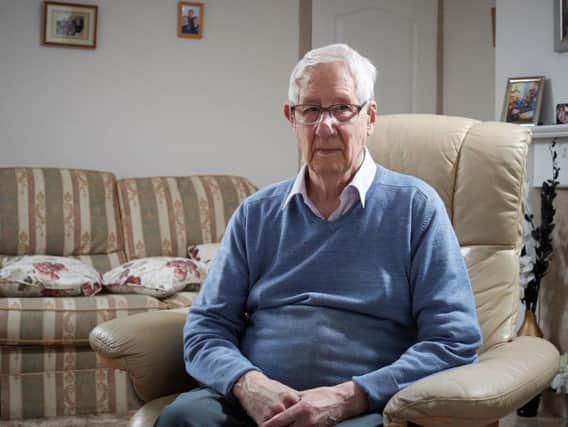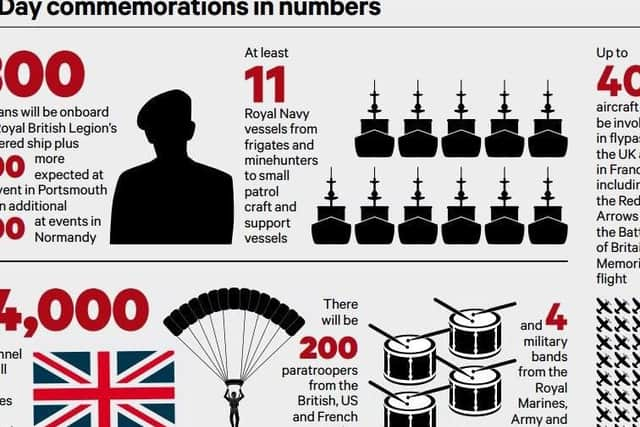D-Day 75th anniversary: Veteran recalls horror of D-Day invasion as friends lay dead on beaches


Reliving the horror of the Second Wold War a D-Day veteran who saw friends die in the Allies’ invasion of France said the effects of war never go away.
Albert Robilliard was 17 when he joined the air force and found himself one of thousands of men sent to invade mainland Europe.
Advertisement
Hide AdAdvertisement
Hide AdAt that time everyone joined up but no one really knew what they were going to face. And the impact of the Normandy landings in June 1944 would last a lot longer than any of them could have known.


This is how Wakefield will mark the D-Day anniversaryWhen he was eventually demobbed after battling his way through the continent he was happy to leave the conflict behind – but under the surface there was something getting to him.
He said: “I was quite happy then because I was going home, going back to the family.
“But when I came out after the war I found it was different being a civilian to being a soldier. I was very tempted to go back in. I didn’t, but I was tempted.
Advertisement
Hide AdAdvertisement
Hide Ad“We lived with the in-laws and there wasn’t any prospect then of getting our home because they weren’t being built. Then things changed and things looked a bit different.
“It’s difficult to understand but a lot of different things go through your mind. After four or five years in the forces you live by numbers. You get up on a morning, do this and do that and it’s all by numbers. When you come back to civilian life and you’re left on your own there is no one to tell you what to do and going back was a serious thought.”
Albert’s craft landed on Gold Beach on the second day of the Normandy landings after his regiment was left out at sea waiting to strike.
Veteran reveals how machine guns "cut down" soldiers at D-Day landingsThe Allies’ plan was to begin the landings on June 5, 1944, but the assault was put back to the next day because of bad weather.
Advertisement
Hide AdAdvertisement
Hide AdAlbert, from Normanton, said: “And it really was bad as well, everyone on the boat was sick. But that was it, you were there, there was nowhere to go. We were left stranded out at sea just waiting.”
The 94-year-old vividly remembers his part in the invasion of France on June 7.
He said: “It was rough. You’ve seen all the films and I know they can take a bit of licence but a lot of what you see on them is realistic.
“I didn’t get shot which meant I was one of the lucky ones. I lost a mate or two. I lost one close friend.
Advertisement
Hide AdAdvertisement
Hide Ad“You have to think there was lot of hype before the battle. In a way it was all built up because you were fighting the enemy.”
This is how the Express reported on D-Day in 1944Albert left his native Guernsey for Rothwell at 16 when people were evacuated from the island during the war.
His mother remained on the island when he left for England as the Germans moved in.
He said: “We were allocated people who would take refugees in and the Yorkshire people were very kind.”
He joined the RAF not long after when he was 17.
Advertisement
Hide AdAdvertisement
Hide AdHe said: “I was on my own, with no family and there was nothing to hold me back so I joined up with the air force.
“There was all the hype about the forces so you just went and volunteered.”
He was trained around the country by army officers as a guard for air force bases.
His training made him an important part of the invasion of France as land was claimed so camps, bases and airstrips could be created and defended as the Allies made their way across mainland Europe.
Advertisement
Hide AdAdvertisement
Hide AdHe said: “We didn’t know we were building up to invading France.”
He said there was a great deal of secrecy about the whole operation. After the D-Day landings, his unit travelled through France, Holland, Belgium and as far east as Hamburg before he was demobbed.
He said: “At a point they said ‘right that’s it you’ve had enough’ but we were hoping to get to Berlin. We never got there.”
He had met his wife Mary in Rothwell and they lived in Cutsyke before moving to Normanton.
Advertisement
Hide AdAdvertisement
Hide AdFrom his role in WWII up to soldiers in recent years who have fought in Iraq and Afghanistan, Albert said the effects that war had on people involved were serious.
He said: “When you look at went on at D-Day, especially with the Americans at Utah Beach, the casualties were high. “There were the medics who dealt with casualties and those who took them away to be buried before graves were eventually made. “That’s a hell of job for those people.”
And he knows that 75 years later some of the lessons that his generation were taught still haven’t been learned.
“The situation the world is in now is terrible, just take Syria. It’s diabolical.”